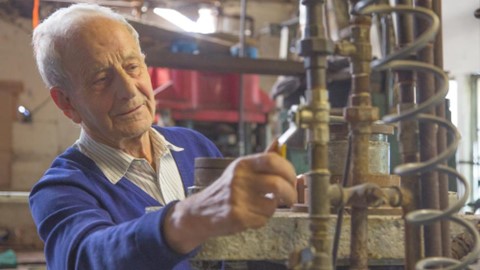Derek Price: the 91-year-old tennis ball maker who hasn’t lost his bounce
The Times
Written by Andrew Saunders
May 31 2022
A All eyes may be on the Queen as her Platinum Jubilee approaches, but Her Majesty is not the only nonagenarian defying convention and still working hard at the head of the family business. At an age when for most their working lives would be but a distant memory, 91-year-old Derek Price remains at the helm of Price of Bath, the last remaining tennis ball manufacturer in the UK.
Far from slowing down he still puts in a six-day week at the firm founded by his father in 1936. “I get in about 8 o’clock each day and leave about 5. I only do five or six hours on a Saturday though,” he says. “You have to have a reason to get out of bed in the morning. It doesn’t take all day to drink a cup of coffee, read the paper and walk the dog.”

What gets him out of bed is a ceaseless quest for the perfect ball. A serial innovator, he came up with the first mini-balls for junior tennis, the first solid golf balls (no longer made due to cheaper rival products) and has pioneered numerous new rubber mixes and bespoke personalisation techniques for promotional balls over the years. He’s even figured out how to make a Union Jack tennis ball, a tricky technical problem due to the multiple colours and the geometrical challenge of transferring the flag’s flat design on to a spherical surface.
The latest product of this lifetime of inveterate tinkering could be the businesses’ biggest opportunity in decades, he reckons — the recycled tennis ball. New balls from old as it were. “It’s like a cake mix, there are lots of ingredients. It took me a long time to get the formulation just right,” he said. Like Coca-Cola, it’s all in the secret recipe — no one wants a tennis ball that has lost its bounce.
Marketed under the Phoenix brand, the new eco-balls are proving a hit with environmentally minded players who want to minimise the carbon footprint of every lob, smash and cross-court winner. As his daughter Louise, who became an executive director of the business in 2010 and now runs the commercial side, explained: “We’ve grown 25 per cent in the last financial year and we’ve just signed two big new orders. We’re on track to make 650,000 balls by the end of the year.”
Price started work in 1945, has been managing director since 1959 and admits that life as a small British manufacturer has been pretty rocky for much of the past 30 years. “In our heyday we were doing 72,000 balls a week and employed around 100 people, but most of our business was lost to the Far East in the late Eighties — to China, South Korea and Vietnam. We couldn’t compete on volume or price.” Output fell to only a few thousand balls a week and at the lowest point only eight workers remained on staff.
What kept him going through the hard times? “I am stubborn. I just refuse to give up,” he said. “We always managed to keep making some kind of money and I don’t have outside shareholders demanding that we grow.”
The company survived by diversifying into rubber parts for the automotive and defence industries, and by becoming a specialist in taking on technical challenges in ball making that giant rivals wouldn’t — or couldn’t — do. “If anybody wants something new developing to do with a ball they come to us. The big companies aren’t interested in developing new products. They want big volumes.”
Nor has age proved any bar to keeping up with the digital revolution. He built the company’s first website himself, despite having no coding experience: e-commerce now accounts for about a third of sales, and he still keeps a weather eye on the web. “Dad’s the one who is on Google Analytics at night, and then in the morning he’ll give us a five-page report on our SEO performance,” Louise said.
Turnover is small — below £1 million — but rising fast, she added. A brand new factory, a mile down the road from the existing Victorian building, is due for completion over the summer and should help the business bounce back even further. Production is anticipated to hit 18,000 balls a week within six months, up from 6,000, with more to come. The ambition is to make all of Price’s balls from recycled materials within the next five years or so.
Derek Price is also busy designing new electronic controls to give the firm’s vintage machinery, some of which is even older than he is, a new lease of life when the move is complete. “We still had all the old equipment from when we were doing larger volumes. It just needed modernising,” he said. “Tennis ball machinery isn’t like a lathe or a milling machine; you can’t buy it off the shelf.”
Price of Bath has signed two big orders for the Phoenix range And with 77 years in the business behind him he is increasingly optimistic about the future. Customers who haven’t bought anything from the company for a decade are starting to order from them again, as rising shipping costs and global disruption mean that domestic suppliers are back on the agenda, he said.
Far from thinking about his pipe and slippers, Price’s mind is firmly on preparing the business to prosper over the next 20 or 30 years of family ownership. “I don’t understand why people retire, really. I’ve got to have something to do, and some problems to solve. You spend most of your life learning, and then you’re supposed to just pack it in. What’s the point of that?”
